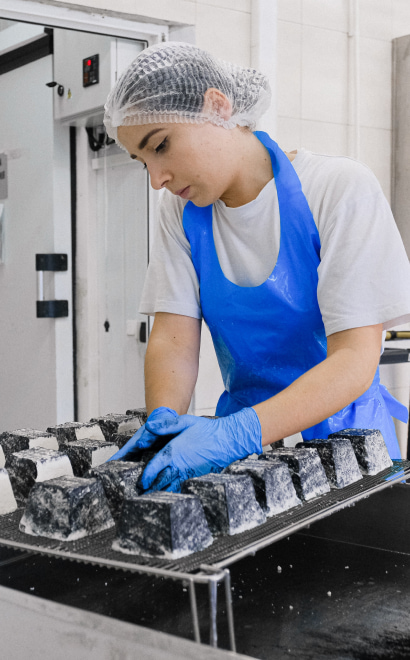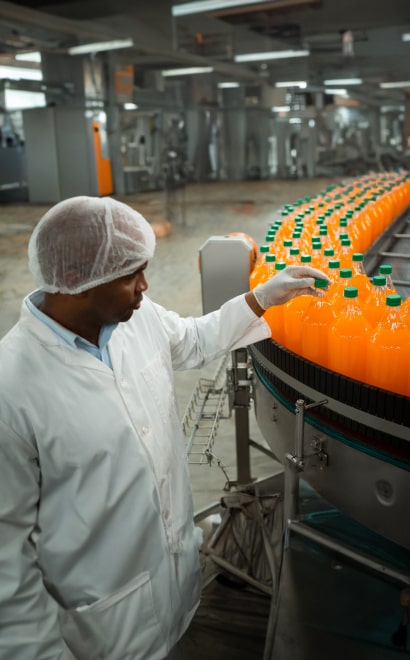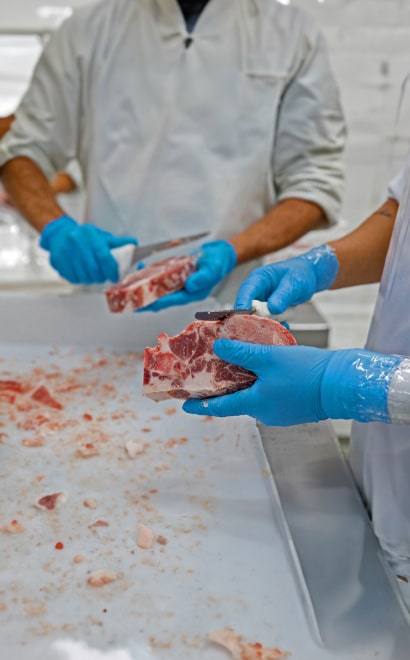The Netherlands
International trainees from Bixter.Work can be a valuable asset for the food technology sector in Holland, as they bring fresh perspectives, new skills, and a willingness to learn and grow within the industry through new ideas and innovative approaches to the food technology sector, increasing productivity in the food technology sector by taking on tasks and projects that free up the time of more experienced staff, bringing international perspectives to the food technology sector in Holland.
Bixter.Work connects well educated international young people, looking to gain their first on-job experience, with Dutch employers in need of help with processes at their factories and establishments, willing to assist trainees in developing their skills and reach their full potential.
Bixter.work trainees are coming from:
Bixter operates on a legal basis by connecting host-employers in need of well-educated, motivated, affordable, and stable employees with young professionals who have completed relevant Bachelor’s degrees and are eager to gain on-the-job training in the Netherlands.



In the context of the Netherlands migration services, a non-EU trainee is an individual who comes from a country outside of the European Union (EU) or European Economic Area (EEA) and Switzerland to undertake a period of training in the Netherlands. Non-EU trainees must obtain the necessary permits and meet specific requirements to be allowed to enter and stay in the Netherlands legally.
The permits required depend on the length and nature of the training, but usually involve obtaining a combined residence and work permit known as the “gecombineerde vergunning verblijf en arbeid” (GVVA). Non-EU trainees are often sponsored by a Dutch company or organization that takes responsibility for them during their stay in the Netherlands. To obtain the necessary permits, non-EU trainees need to meet certain conditions and provide supporting documentation.
The process of obtaining the necessary permits can be a complex and challenging undertaking. Bixter offers professional consultancy services to navigate this process with ease. Our team of experts provides guidance to ensure that the applicants meet the necessary conditions and have all the required documentation for successful permit applications.
With Bixter, Dutch host-employers can rest assured that they are in good hands and focus on their businesses, confident that the migration services needs are taken care of.
If you’re planning to sponsor a non-EU trainee or apprentice in the Netherlands, it’s important to be aware of the timeline for obtaining the necessary permits.
The process of obtaining a combined residence and work permit, known as the “gecombineerde vergunning verblijf en arbeid” (GVVA), can take approximately four months to be processed by both the Immigration and Naturalisation Service (IND) and the Employee Insurance Agency (UWV) for non-registered sponsors/host-employers. This timeline can vary depending on various factors such as the complexity of the application and the specific requirements of the training program. The processing time is shortened to ~ 2 – 4 weeks for recognized sponsors/host-employers.
At Bixter, we provide consultancy services to potential sponsors to ensure a smooth and efficient application process. Our team can guide you through the process and help you gather the required documentation and apply to become a recognised sponsor/host-employer, ensuring that all necessary requirements are met to minimize delays and expedite the application process.
To ensure that your company’s recruitment process runs smoothly, it is highly recommended that you plan ahead and account for the waiting period involved in the visa processing. Taking a pragmatic approach and considering the necessary time required for visa processing can help your company ensure timely receipt of qualified trainees. Furthermore, this approach will enable you to comply with all relevant regulations and procedures, providing a seamless experience for all involved parties. By working with a consultancy service like Bixter, you can gain access to expert guidance and support in navigating the visa processing requirements, ensuring that your company can attract and host the best non-EU trainees.
The workweek standard for international trainees in the Netherlands is 40 hours per week. Overtime can be acceptable in certain conditions, such as peak season. Excessive overtime may violate their work and residence permit requirements.
Compliance with this rule ensures a positive traineeship experience and avoids legal issues.
At Bixter, we know that hosting an abroad trainee gives an amazing chance for cultural exchange. Also, both parties must follow the regulations established by the local immigration services.
It should be noted that trainees cannot start working until their work and residence permits have been linked to the operations of the host employer. To fulfill legal requirements and guarantee a smooth hiring procedure, compliance with this criteria is essential. Regarding the revised immigration laws, our specialists will provide in-depth information and keep you informed if any changes are made.
To ensure a successful hosting experience, Bixter will create a thorough hosting training plan based on the information, tasks and responsibilities provided by host-employers. We carefully check the education of each of our applicants to ensure the perfect match between the traineeship place and the trainee.
Non-EU trainees who wish to do a traineeship in the Netherlands must have a training plan that outlines the specific educational and training objectives of their internship. The training plan is a crucial component of the traineeship permit application process, and it must be detailed, comprehensive, and meet the eligibility requirements set by the Immigration and Naturalization Service (IND) and the Employee Insurance Agency (UWV).
Bixter.work is specialized in providing this service and can help Dutch companies develop a valid and compliant training plan for their non-EU trainees. With Bixter’s assistance, companies can ensure that their training plan meets all the necessary requirements, including the specific tasks and responsibilities of the trainee, their educational objectives, and the expected duration of their internship.
Bixter’s experts have a solid knowledge of the Dutch immigration regulations and requirements related to traineeship programs, and they can guide companies through the entire process of preparing a valid training plan. By working with Bixter, companies can ensure that their non-EU trainees are well-prepared and that their traineeship program meets all the necessary criteria for a successful visa application.
At Bixter, we understand how complicated and time consuming the recruitment and registration process of foreign trainees can get. This is why our professional team will be glad to assist you at every step of this way. Prior to trainees’ arrival to the Netherlands, our offices and global agents take care of the majority of their issues, including visa application completion, travel arrangements, sharing important information about registration procedures and visa validation.
At Bixter, we know how important it is to focus on the most important processes of the business. This is why we are ready to take over the matching processes, while the host-employers can focus on other important activities and grow their businesses.
Here is a breakdown of the operations that Bixter is managing for employers and host-employers:
– sourcing and pre-screening of applicants according to criteria of the host-employer and migration service regulations,
– sharing important information about the tasks and responsibilities assigned to the trainee to make sure he/she has realistic expectations,
– conducting required paperwork for visa application and following up with responsible migration institutions involved,
– managing arrival of trainees, sharing informative booklets on the registration process – for a smooth integration process
– providing support for both host-employer and trainee within the validity of the traineeship period
In order to host Non-EU trainees, adequate living conditions need to be provided by host-employers for a monthly rent. The rent needs to be affordable for the trainees, as they will be paying it from their monthly allowance, unless otherwise agreed
Here is a list of requirements that need to be fulfilled:
| Cookie |
|---|
| cookielawinfo-checkbox-analytics |
| cookielawinfo-checkbox-functional |
| cookielawinfo-checkbox-necessary |
| cookielawinfo-checkbox-others |
| cookielawinfo-checkbox-performance |
| viewed_cookie_policy |
| Cookie | Type | Duration | Description |
|---|---|---|---|
| cookielawinfo-checkbox-analytics | 0 | 11 months | Denne cookie er angivet af GDPR Cookie Consent plugin. Cookien bruges til at gemme brugerens samtykke til cookies i kategorien "Analytics". |
| cookielawinfo-checkbox-functional | 0 | 11 months | Cookien er indstillet af GDPR -cookie -samtykke til at registrere brugerens samtykke til cookies i kategorien "Funktionel". |
| cookielawinfo-checkbox-necessary | 0 | 11 months | Denne cookie er angivet af GDPR Cookie Consent plugin. Cookien bruges til at gemme brugerens samtykke til cookies i kategorien "Analytics". |
| cookielawinfo-checkbox-others | 0 | 11 months | Denne cookie er angivet af GDPR Cookie Consent plugin. Cookien bruges til at gemme brugerens samtykke til cookies i kategorien "Andet. |
| cookielawinfo-checkbox-performance | 0 | 11 months | Denne cookie er angivet af GDPR Cookie Consent plugin. Cookien bruges til at gemme brugerens samtykke til cookies i kategorien "Ydelse". |
| viewed_cookie_policy | 0 | 11 months | Cookien er angivet af GDPR Cookie Consent plugin og bruges til at gemme, om brugeren har givet samtykke til brugen af cookies eller ej. Det gemmer ingen personlige data. |